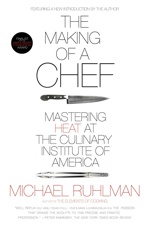"The Making of a Chef" Book Writeup
September 24, 2013
 The Making of a Chef: Mastering Heat at the Culinary Institute of America
Michael Ruhlman
ISBN: 080508939X
The Making of a Chef: Mastering Heat at the Culinary Institute of America
Michael Ruhlman
ISBN: 080508939X
What’s the point?
Ruhlman — a journalist who wants to learn the art of cooking — spends
time embedded in the kitchens of the Culinary Institute of America. This book provides
an inside look at the modern culinary education and what it means to be a chef.
How was it?
The most impressive and lasting virtue from the book was discipline.
The course structure is very demanding; students rotate sections every few weeks instead of traditional university semesters. This leaves little room for mistakes or slacking off. Kitchen hours seemed pretty extreme to me, if you were on a morning shift you might arrive at 4am and work until 4pm. You just busted your ass for twelve hours and want nothing more than to go crash, but instead you have to start prepping for the next day.
Discipline also came up when talking about food quality. I think this quote really sums up the ethos of a true chef,
We project our values by the food we have on the plate, not necessarily in the same artistic sense, but in the sense of flavors we offer. I always feel that when I put food on the plate for my family - anybody - I’m saying, “I feel good about this. This is what I believe is good food.” If it’s not good food, I wouldn’t put it there.
Ensuring a rigorous quality standard takes incredible discipline. When you are in the weeds in the kitchen, you need to get food out. But a true chef will not let the quality suffer, even if it means working late or redoing sub-par dishes that the customer might not notice.
This same concept of discipline aligns perfectly with software and is something that I have been struggling with recently. Code quality, good design, maintaining a test suite — all of these things are signs of a true craftsmen, but they are easy to shrug off without discipline.
When a winter storm is preventing Ruhlman for making the commute to the CIA for a final exam, he phones the instructor — expecting his understanding and maybe a chance to reschedule. But this is not how a chef operates. The instructor says,
We’re different. We get there. It’s part of what makes us a chef…The food is either finished at six o’clock or it’s not. It wasn’t simply that excuses were not accepted here - excuses had no meaning at all.
A professional (at anything) does not make excuses, they do what it takes to get the job done.
Who should read it?
I really enjoy reading books from non-software industries, especially those that
value quality and treat their job like a craft. If you have any interest in cooking
(even if you just watch Top Chef) you will like this book.
